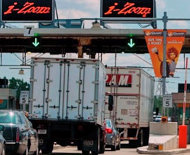9/24/2014
Indiana Toll Road Declares BankruptcySpanish-Australian consortium behind the Indiana Toll Road cannot pay its $6 billion in debt obligations.

Public-private transportation partnerships continue to fail around the world. The Spanish-Australian consortium that runs the Indiana Toll Road became the latest casualty seeking Chapter 11 protection in the US Bankruptcy Court for the Northern District of Illinois. On Tuesday, Judge Pamela S. Hollis began hearing the case.
This was supposed to be a model deal for other states to follow. In 2006, then-Governor Mitch Daniels (R) leased the 157-mile Indiana Toll Road to Cintra and Macquarie Bank, operating as the ITR Concession Company, in return for an up-front payment of $3.8 billion. Daniels promised to use that money to build new roads over ten years under a program he called "Major Moves," while the consortium was allowed to charge motorists steadily rising tolls until the year 2081.
The consortium came up with the cash by borrowing $4.1 billion off the prospect of a "guaranteed" stream of future toll returns. Revenue projections proved to be unrealistic and the consortium was unable to turn a profit.
"The global economic recession and actions undertaken by the United States and various European governments in response thereto have driven interest rates down to historic lows, creating a substantial net obligation under the debtors' interest rate hedging obligations," consortium CEO Fernando Redondo told the court in a filing on Sunday. "As a result, absent a restructuring, the debtors will not have sufficient cash flows to service their funded debt obligations... and operate the toll road in a prudent manner."
Motorists paid $196 million to use the road last year while the consortium owed $193 million in debt service payments. This left just $3 million to cover the cost of 244 employees, maintenance, capital upgrades and related expenses. Reserves were exhausted in December, and the consortium missed a $102 million interest payment in June. With interest, the consortium's total debt obligation now stands at $6 billion.
The promise of the Major Moves Fund also failed to deliver. The $2.6 billion fund was supposed to have been set aside from the $3.8 billion payment to the state government. It was to grow by 5.25 percent annually from investments. That did not happen, and the money ran dry in 2013, though tolling will continue for at least another 69 years.
The toll road's failure is not necessarily unexpected or unwanted for the companies involved. Australia's Macquarie Bank, which indirectly owns half of the consortium, is known as the "millionaire's factory" with a knack for turning profits from flipping assets and collecting management fees, according to a lawsuit filed in New York (view case).
Such failures are common. The 91 freeway high occupancy toll lanes in Orange County, California was one of the first modern toll projects to go wrong, with the county taxpayers in 2003 paying for more than the original cost of construction to buy out the project. San Diego's South Bay Expressway went bankrupt in 2010 and was also bought out by county government. California's Foothill-Eastern Transportation Corridor Agency, which runs the 241, 261 and 133 toll roads in Orange County, has been teetering on the edge of default despite $1.7 billion in subsidies from the taxpayer. The agency in charge of the road refinanced in December, extending the tolling period out to the year 2053.
In South Carolina, the Greenville Southern Connector went bankrupt in 2010. Transurban, the Australian company that runs the Pocahontas Parkway in Richmond, Virginia, wrote down the toll road as having a value of $0 in 2012.
In Australia, the operator of the Clem7 toll road went bankrupt last year, joining the Airportlink toll road, the Lane Cove Tunnel and the Cross City Tunnel. In Spain, ten toll concessions, including the Madrid-Toledo highway, became insolvent in 2012. The Spanish government provided more than a billion euros in bailout money to the tolling firms Abertis, Acciona, ACS, Bankia, Cintra, OHL and Sacyr Vallehermoso.


